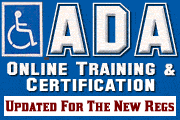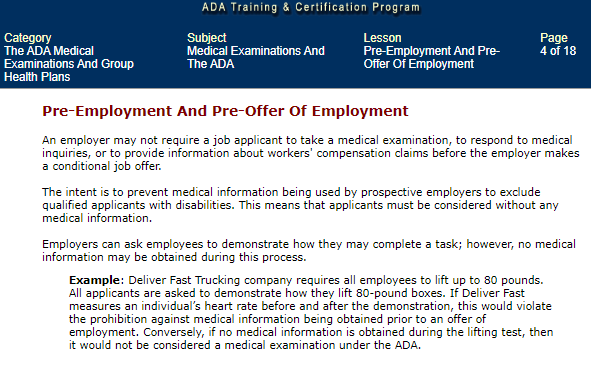ADA Training & Certification Course Online for HR Professionals
The ADA Training & Certification Program
The Americans with Disabilities Act, or "ADA", prohibits discrimination in recruitment, hiring, training, promotions, pay, social activities, and other privileges of employment. The ADA also restricts questions that can be asked about an individual's disability and requires employers to make certain "reasonable accommodations".
The ADA is applicable to employers with 15 or more employees. These employers are required to provide qualified individuals with disabilities an equal opportunity to benefit from the full range of employment-related opportunities available to others
As a human resources representative and benefits professional, navigating the specifics of the ADA and the EEOC guidance documents can be daunting and time-consuming. But now there's help!
About The ADA Training Course
Our ADA Training & Certification Program covers the ADA rules and requirements for employers by providing numerous suggestions for handling everything from requests for a reasonable accommodation to medical certifications to job restructuring and more!
The Program also reviews how to integrate ADA compliance with other applicable laws such as the Family Medical Leave Act (FMLA) and the Pregnancy Workers Fairness Act (PWFA).
The Program's easy-to-learn design has numerous tips, examples, and procedural recommendations that are interspersed with interactive Q and A sessions so that you are confident that you are learning and in where your strengths and weaknesses lie.
You can test to earn a "Certified ADA Administrator" designation upon completion of the Program. The ADA Training & Certification Program also qualifies for eight hours of SHRM and HRCI re-certification credits!
What You Will Learn From Our Online ADA Compliance CourseBelow are a few of the things our ADA compliance course will teach you about your ADA administrative requirements.
ADA Compliance Basics:- Employers Subject To The ADA
- Definition Of Employer
- Exceptions
- Basic Requirements For Employers
- Required Postings
 Advanced Compliance Solutions:
Advanced Compliance Solutions:
- Reasonable Accommodation Requests
- Medical Certifications
- Drug Testing
- Mental Impairments Under The ADA
- Job Restructuring
- Discipline And Terminations
- Documentation
- Return-To-Work Issues
- Steps For Handling - And Refusing - A Reasonable Accommodation
- Dealing Wich Charges Of Retaliation And Coercion
- Improperly Handling Return-To-Work Issues
- Integration With COBRA, FMLA, And Other Laws
View the full Agenda
Excerpts From Our ADA Training & Certification Program Below are a couple of samples from our ADA course. Simply click the applicable link to get an overview of the training or, for a larger view, click here to see the complete list of covered topics.
Below are a couple of samples from our ADA course. Simply click the applicable link to get an overview of the training or, for a larger view, click here to see the complete list of covered topics.
- Which Employers And Employees Are Subject To The ADA?
- Reinstatement Rights Under The ADA's Reasonable Accommodation Rules
The ADA Training & Certification Program is ideal for human resources professionals and HR managers who handle day-to-day ADA administration.
It is also good for Third Party Administrators, HR Managers, or CFOs who seek satisfaction knowing that their administrators are properly trained and up to date on ADA issues. Last, individuals looking to add value to their job experience can earn the valued "Certified ADA Administrator" designation.
Benefits Of The ADA Certification Program- Award-winning, easy-to-use interface that includes numerous "Examples", "Administrative Tips" and "Procedural Recommendations" that highlight key learning areas
- Interactive Q&A with answer rationale provided to help ensure learning and check your progress along the way
- Interactive "End of Lesson Quizzes"
- Eight hours of SHRM and HRCI re-certification credits
- Access to all training materials for one year from date of purchase
- Certified ADA Administrator exam included for free
- Renewal for all materials - and your certification - for only $99 per year
- FREE updates when the law changes
Your ADA training can be purchased as a Training & Certification Program only ($799), Manual only (searchable, plus includes sample forms and notices) ($799), or combined ($999). We also offer discounts for purchasing training for multiple employees or administrators.
More About ADA Requirements For Employers
An Overview Of ADA RegulationsThe Americans with Disabilities Act, or ADA, was enacted to remedy discrimination against people with disabilities in employment, public services, public accommodations, transportation, and telecommunications. There are five sections or "titles" to the ADA:
- Title I – Prohibiting employment discrimination based upon an individual's disability
- Title II – Prohibiting discrimination by state and local governments based upon an individual's disability
- Title III – Prohibiting discrimination by public accommodations based upon an individual's disability
- Title IV – Setting requirements for the telecommunications industry
- Title V – Contains miscellaneous provisions which apply to EEOC's enforcement of Title I
Title I of the ADA requires employers with 15 or more employees to provide qualified individuals with disabilities an equal opportunity to benefit from the full range of employment-related opportunities available to others.
Title II of the ADA covers all activities of State and local governments regardless of the government entity's size or receipt of Federal funding. Title II requires that State and local governments give people with disabilities an equal opportunity to benefit from all of their programs, services, and activities (public education, employment, transportation, recreation, health care, social services, courts, voting, and town meetings).
Title III of the ADA covers businesses and nonprofit service providers that are public accommodations, privately operated entities offering certain types of courses and examinations, privately operated transportation, and commercial facilities.
Title IV addresses telephone and television access for people with hearing and speech disabilities. It requires common carriers (telephone companies) to establish interstate and intrastate telecommunications relay services (TRS) 24 hours a day, 7 days a week.
What Are The ADA Requirements For Employers?ADA requirements apply to employers with 15 or more employees on 20 or more calendar work weeks in the current or preceding year. ADA requirements ensure that employers covered by the ADA have to make sure those individuals with disabilities have an equal opportunity to apply for jobs and to work in jobs for which they are qualified.
A key, and often misunderstood ADA requirement is that employers must make reasonable accommodation to the known physical or mental limitations of an otherwise qualified applicant or employee with a disability, unless such an employer can demonstrate that the accommodation would impose an undue hardship on the operation of its business.
Additionally, harassing someone because of a disability is a violation of the ADA just as harassing someone because of race, sex, religion, or national origin is a violation of the Civil Rights Act. Further, it is a violation of the ADA to retaliate against an individual because he/she has have filed a complaint, or participated in the complaint process, with regards to the ADA.
Tips For Your Online ADA Training Classes
Like most federal employment laws, ADA employer guidelines are very strict, so employers should make sure that they have a good ADA training program. Your ADA training class should include:
- What is - and isn't - a disability
- Employee eligibility
- Leave entitlement
- Employer posting requirements
- Intermittent FMLA leave guidelines
- Reasonable Accommodations
- Medical Examinations and Inquiries
- How to respond when an individual refuses an offered accommodation
- Retaliation
- Ending Leave
- When and how to terminate an employee on a leave of absence without violating the ADA
- What are the primary purposes of the ADA?
The Americans with Disabilities Act (ADA) is a federal civil rights law enacted in 1990 for the purpose of prohibiting discrimination against individuals with disabilities. The ADA is broad in scope, covering all types of discrimination against individuals with disabilities in the areas of employment, education, transportation, private and public accommodation, and so forth. - Why is the ADA important?
The ADA is important because it protects the civil rights of individuals with disabilities and ensures they have the same opportunities as everyone else. In addition, the ADA helps to break down barriers that prevent individuals with disabilities from participating in mainstream society. - What is the ADA and its objectives?
ADA is the Americans with Disabilities Act, which was passed in 1990. The ADA is a law that prohibits discrimination against people with disabilities in all areas of public life, including employment, education, transportation, and access to public and private places. The ADA's objective is to ensure that people with disabilities have the same rights and opportunities as everyone else. - What is covered under the ADA Training & Certification Program?
The ADA Training & Certification Program covers all aspects of the Americans with Disabilities Act, including how to provide reasonable accommodation and avoid ADA violations. The Program also reviews how to integrate ADA compliance with other relevant laws, such as the Family Medical Leave Act (FMLA). Additionally, the ADA Training & Certification Program provides an overview of medical examinations and how to properly administer them in the workplace.
Pricing:
Your ADA training can be purchased as a Training & Certification Program only ($799), Manual only (searchable, plus includes sample forms and notices) ($799), or combined ($999). We also offer discounts for purchasing training for multiple employees or administrators.
- Certificate Program For FMLA, ADA, and PWA Compliance
- FMLA Training & Certification Program
- PWFA Training & Certification Program
- Integrating FMLA, ADA, COBRA, And Workers' Compensation Training & Certification Program
- Bring Our Training To Your Location!




